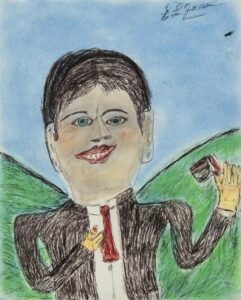
IRONTON, OHIO by Dalton Monk
In Ironton, Ohio you could change your name to Randall or Phillip. You could gain five-hundred pounds and chew the ends of pencils till the splinters infected your gums and gangrene you. You could get a construction job, travel the tri-state area. Ride big Zamboni machines and crash into poles. Get fired, go back to your hotel, finish Sea Biscuit. Curse God, call him Todd.
He did these things. He did not, however, gain gargantuan weight or become gangrened. He gained some muscle. In Ironton, Ohio he was a squabbling man who worked with his hands and chewed his fingernails. He did not call his mom or dad or tell them where he was. He moved in long strides. He changed his name for a day then went back to his original, Todd-given name: Kelly Sue. Two girl names. He managed.
Not far from his apartment was a school hiring custodians. Kelly had just received an Associate’s degree in Political Science. He did not mention his credentials in the interview for fear that they’d ask him questions, possibly about the trajectory of his life or the current political status of America, neither of which he understood or would pretend to understand. They asked if he knew how to mop floors and deal with backed-up toilets. He started the next day.
In the mornings, he snuck jolly ranchers into the zippered pockets of kids’ backpacks and cargo shorts. He provided them with small pieces of wisdom in scrolled-up post-it notes: Do Not Do What You’re Told. He collected trash from waste baskets left outside doors. The cart he pushed made a rackety sound while rolling through the halls, and he’d sometimes imitate the noise so loudly that teachers would shush him. If someone threw up, he poured saw dust over it. He locked doors, he opened them. He worked the pedals of a tired-looking bicycle to and from his apartment. You could become someone in Ironton, Ohio. You could become anyone.
~
In Ironton, Ohio the churches accepted you, as long as you did not cause a racket. During his first attendance at a small Nazarene Church, he found himself a young lady in the choir who sang half-heartedly and held her hands behind her back in attempt to hide what she thought was a lumpy bottom. After the service, he told her he’d written her a ballad, and she asked if they’d ever met. This didn’t matter. Kelly had taken home from work a banjo left in the custodial room. He contained some kind of promise for her as, if not a long-time suitor, a short-term interest. She tailed him on his bike, coming somewhat close at stoplights to nudging his back tire with her front bumper, and did not comment on the fact that his apartment was a small loft above a convenience store. He had promised her bluegrass beauty. She intended to receive it.
Before stepping inside, he said, “It sounds best at school.”
She was behind him with her hair in a strangely tight bun that widened her face. She wasn’t taller than him, but she at least weighed as much. “Okay.”
On account she wouldn’t fit on the back of his bicycle and neither would he, she drove them to the school. Inside, he brought out his cart, his bucket of chemicals, the things he never had to use, like an old buffer that didn’t buff and a slim and silver oboe.
“What could they possibly want me to do with this,” he said, holding an old batter’s helmet.
“Play that thing,” she said. She had Door Dash orders to pick up and deliver. And she was beginning to lose interest in this ordeal.
“The acoustics are better in the gymnasium,” he said and, now wearing the helmet in a covert task to hide his uncombed hair, led her through tall double-doors. The wooden stairs creaked as he made his way to the top, and he began his free solo-ed pluck of the fingers on both ends of the banjo. It was no good, but he kept on. He played eyes-closed through her explanations of having to leave, which were kind and genuine, and she found her way out of the building and into her vehicle, where she made her way to the nearest Wendy’s. He was so banjo-focused he’d not heard her say a thing or leave through the squeaky doors, and, until he left the building and found her car to no longer sit between the two yellow lines, he’d thought his ballad was perhaps so profound it made a woman disappear. He locked up. He ran in whichever direction or curve in the road suited him.
~
He found a pub called Larry’s. He posted up at the edge of the bar, twisting his mouth to the side and chewing the inside of his cheek. He set the batter’s helmet in a stool and positioned his suede boots in cowboy fashion, shins crossed, one sole flat on the ground, the other toe digging into splintered wood. He plucked from his pants pocket a toothpick he’d not known was there and jammed it into the thin space between his bottom central incisors. He landed on a fifty-something slender bender with tiny, rimless glasses. The man was throwing darts at an old dart board, which hung beneath a buck with Christmas lights decorated through and around its antlers. None of this excited Kelly. Perhaps he was not a man of the bars.
Kelly stepped toward the man. He wanted to appear as though he were taller. “I might be a bar man,” he told him. “I don’t know.”
“What?” The man retrieved the darts from the board and shifted his weight so that he faced Kelly. The wrinkles on his forehead suggested that, although he was disturbed, he was slightly intrigued.
“I said I might be a man of the bars. I don’t know. That’s what I said. Pretty sure.”
“Are you messing with me?” He placed a hand on his hip, somewhat flamboyantly.
“Now I’m confused.” Kelly reached into his shirt pocket for one of the mints he’d brought in preparation. He offered the man a Ricola.
The man declined.
“This is what I’d call an unsuccessful conversation,” said Kelly.
He must not have been a bar man. But he was still someone of importance here in Ironton, Ohio—signs and placards hung all around the room with platitudes such as, “YOU ARE IMPORTANT” and “KNOWLEDGE IS POWER”. Knowledge is power, he thought to himself, you are important. He placed his helmet back on his head and stared down the marble eyes belonging to the buck.
A small fellow approached the dart-throwing man with regularity, and they discussed the upcoming election and the persons they liked for which jobs and who was good-looking and who had gout. If a guy with gout could make it, anyone could. Kelly could run for governor. Kelly could run for mayor. Become a delegate, whatever that meant, make his way up to a seat in the House, run for president, marry himself a Kennedy. Later that night he ordered thirty-some shirts online that said, “IF YOU WANT TRUE, VOTE KELLY SUE.”
After they arrived, he stood in front of Walmart and passed them out to any patrons that would take them. When someone asked his policies, he stated he was a man of the people, he was running for mayor. “I’m your man.” He biked home and called people in the phone book, anyone with a remotely goofy or serious-sounding name. Billie Jo Cobb. Lyle West. Look out for Kelly Sue in the next election. Vote your buddy, your neighbor.
~
They had caught him on camera bringing with him a young woman to his place of work and leaving with a helmet, and they fired him with little to no flair. Around town, he passed out shirts. He wore his helmet, he rode his bike, he threw fallen apples at cars.
He had a problem. This was obvious. He could not operate as a normal human being within society, within Ironton, Ohio.
He jumped on his bike with his helmet and made for a place he knew was safe, but it was too far for a motorless two-wheeled machine. He biked along the highway with his thumb up and out and protruded his tongue at those that whizzed by. He eventually found luck and grace in an old man driving a four-door van.
Kelly stood at the passenger side, waiting for instructions. “I’m Bobby,” said the old man. “I don’t play no games. Don’t get any ideas,” he said. After speaking, he shut his mouth and pointed forward with the stubbled underbite of his cleft chin.
“I don’t have any ideas,” said Kelly. “Just the bike.”
“Put it in the back. Ion’t care.”
The van smelled of dirt and wet dog, and the tinted windows made it difficult to see outside the vehicle. It was looking as though it might rain. An old country song played on the radio. Then the old man placed in Kelly’s lap his long-fingered hand.
Kelly began to fear for his life. “People know me,” he said. “I’m the mayor, for God’s sakes.”
“I’m not gonna kill you,” said the old man. “But you shouldn’t hitchhike.”
At the first stoplight, Kelly got out of the van. “I’m good here,” he said. He attempted to open the back door and retrieve his bike, which he’d had to place across the seats all zigzag and wonky, but the light turned green, and the old man yelled, “Mine now!” The van drove forward and fell in line with a row of cars.
Kelly began to cry but pulled from his shirt pocket a Ricola and sucked the sweetness. He made a call and waited underneath a bridge where a squirrel continued to dangerously crisscross the road with no goal in mind.
Then his dad’s car rolled to a stop beside him. His mom reached over her seat for the backdoor, and Kelly stood with both hands free, watching her struggle with the handle.
They were quiet. The rain and road were loud. He took off his helmet and sat it on his thigh. His mom turned around in her seat and glanced at it but decided to not comment.
“I’m glad you called,” she said.
“What?” said his dad.
“I told him I was glad he called!”
Kelly had a smudge of dirt on his thigh his mom wiped with her thumb. “’Vote Kelly Sue,’” she said. “What’s that?”
He shook his head. “It was stupid.”
“What?” asked his dad.
“He said it was stupid!”
His dad kept looking at him in the rearview mirror, not so much with concern but something else. “Your dad’s excited to see you,” she said. She stuffed her hands beneath her thighs to keep them from shaking. “What have you been up to?”
He watched the road roll behind him and listened to the wind scream through the gap between mirror and door. He placed the helmet back on his head. “I wanna go by Phillip now.”
“What?” asked his dad. “What’d you say?”
“I said call me Phillip! Or Randall!” He checked underneath his seat for something to steady his own shaking hands and came up with a small and perfect ball of lint. He unfurled it in his fingers, watching the fine thread unravel into a crazed and curly mess.
(8/14/23)
Dalton Monk lives in Huntington, West Virginia. His stories have appeared in New York Tyrant, Joyland, and X-R-A-Y.
